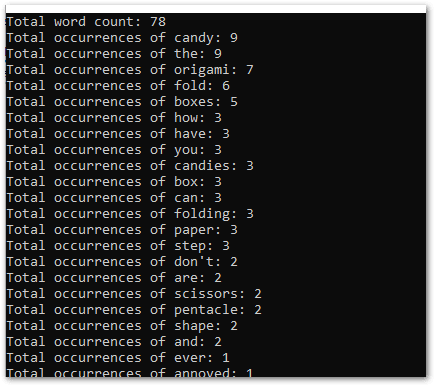
Usman Aziz
Posted on October 18, 2019
Repetition of data can diminish the worth of the content. Working as a writer, you must follow DRY (don’t repeat yourself) principle. The statistics such as word count or the number of occurrences of each word can let you analyze the content but it’s hard to do it manually for multiple documents. So in this article, I’ll demonstrate how to programmatically count words and the number of occurrences of each word in PDF, Word, Excel, PowerPoint, Ebook, Markup, and Email document formats using C#. For extracting text from documents, I’ll be using GroupDocs.Parser for .NET which is a powerful document parsing API.
Steps to count words and their occurrences in C
1. Create a new project.
2. Install GroupDocs.Parser for .NET using NuGet Package Manager.
3. Add the following namespaces.
using GroupDocs.Parser;
using System;
using System.Collections.Generic;
using System.IO;
using System.Linq;
4. Create an instance of the Parser class and load the document.
using (Parser parser = new Parser("sample.pdf"))
{
// your code goes here.
}
5. Extract the text from the document into a TextReader object using Parser.GetText() method.
using (TextReader reader = parser.GetText())
{
}
6. Split up the text into words, save them into a string array and perform word count.
Dictionary<string, int> stats = new Dictionary<string, int>();
string text = reader.ReadToEnd();
char[] chars = { ' ', '.', ',', ';', ':', '?', '\n', '\r' };
// split words
string[] words = text.Split(chars);
int minWordLength = 2;// to count words having more than 2 characters
// iterate over the word collection to count occurrences
foreach (string word in words)
{
string w = word.Trim().ToLower();
if (w.Length > minWordLength)
{
if (!stats.ContainsKey(w))
{
// add new word to collection
stats.Add(w, 1);
}
else
{
// update word occurrence count
stats[w] += 1;
}
}
}
7. Order the words by their occurrence count and display the results.
// order the list by word count
var orderedStats = stats.OrderByDescending(x => x.Value);
// print total word count
Console.WriteLine("Total word count: {0}", stats.Count);
// print occurrence of each word
foreach (var pair in orderedStats)
{
Console.WriteLine("Total occurrences of {0}: {1}", pair.Key, pair.Value);
}
Complete Code
using (Parser parser = new Parser("sample.pdf"))
{
// Extract a text into the reader
using (TextReader reader = parser.GetText())
{
Dictionary<string, int> stats = new Dictionary<string, int>();
string text = reader.ReadToEnd();
char[] chars = { ' ', '.', ',', ';', ':', '?', '\n', '\r' };
// split words
string[] words = text.Split(chars);
int minWordLength = 2;// to count words having more than 2 characters
// iterate over the word collection to count occurrences
foreach (string word in words)
{
string w = word.Trim().ToLower();
if (w.Length > minWordLength)
{
if (!stats.ContainsKey(w))
{
// add new word to collection
stats.Add(w, 1);
}
else
{
// update word occurrence count
stats[w] += 1;
}
}
}
// order the collection by word count
var orderedStats = stats.OrderByDescending(x => x.Value);
// print total word count
Console.WriteLine("Total word count: {0}", stats.Count);
// print occurrence of each word
foreach (var pair in orderedStats)
{
Console.WriteLine("Total occurrences of {0}: {1}", pair.Key, pair.Value);
}
}
}
Results

Posted on October 18, 2019
Join Our Newsletter. No Spam, Only the good stuff.
Sign up to receive the latest update from our blog.





